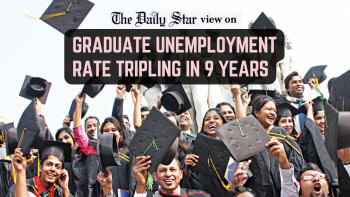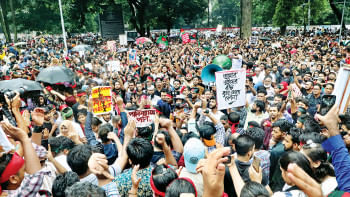Can we reverse the brain drain?

A recent study by British Council, conducted before Bangladesh's 12th parliamentary election, has revealed a concerning trend: that 55 percent of our youth want to move abroad due to unemployment, corruption, as well as various discriminatory and authoritarian practices. This reflects the deep frustration that has taken root in society over the years. For too long, young people have had to contend with obstacles in government hiring, insufficient jobs for an ever-growing pool of graduates, and limited politico-economic opportunities, all coalescing to create a suffocating environment for them. This eventually boiled over during the 2024 quota reform movement, leading to the ouster of the Awami League regime.
The survey, held among individuals aged 18 to 35 across diverse backgrounds, found that 37 percent identified corruption and nepotism as the primary causes of unemployment, while 20 percent pointed to discrimination in hiring practices. Another notable, if unsurprising, finding is that 72 percent were eager to vote in the January 7 election, before the autocratic regime again deprived them of this basic right. The cumulative effect of these grievances very much remains, even after the political changeover on August 5, pushing many to continue seeking opportunities abroad. Despair and desperation still accompany many who have seen their aspirations come unstuck.
Reversing this trend and engaging our young workforce in rebuilding the nation stands as a formidable challenge for the interim government. It, therefore, must give them hope by generating more jobs and creating an ecosystem that rewards merit, hard work, innovation and entrepreneurship. Moreover, the government must undertake reforms in key institutions to serve greater public interests. In the survey, the top priority identified by young respondents was education reform. In that respect, modernising our education system by making it more skills-based and market-oriented remains a priority. Corruption, too, must be uprooted across all sectors. Furthermore, an environment must be established where people, regardless of social class, religion, or ethnicity, can voice their opinions freely and without fear.
The government has initiated its state reform agenda by setting up various commissions for various sectors. We hope these commissions can operate independently, without interference from vested interests. Only through genuine political and institutional reforms can we empower our youth and inspire them to contribute to the nation's progress. This is crucial to fulfil the promise of a brighter, more equitable future for Bangladesh.


 For all latest news, follow The Daily Star's Google News channel.
For all latest news, follow The Daily Star's Google News channel. 










Comments